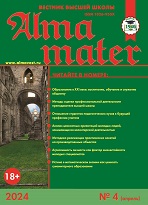http://dx.doi.org/10.20339/AM.05-16.095
V.V. Kotlyarova is D. Sc. in Philosophy, doc.
M.M. Shubina is D. Sc. in Philosophy, prof.
O.N. Sysoeva is Cand. of Sociological sc., doc. at
Institute of Entrepreneurship and Service Sector —
branch of Don State Technical University in the city of Shakhty, Rostov region
e-mail: Biktoria66@mail.ru
Analyzed is the problem of phenomenon of modern informational communicative technologies in form of social networks and their impact on auditorium. Presented is theoretical comprehension of phenomena of social networks. Substantiated is, that modern informational and communicative technologies promote the growth of social activity of members of society. Proved is, that social networks have both positive and negative characteristics. Shown is specificity of impact of communication in social networks on youth. Also comprehended is phenomena of youth extremism in social networks. In connection with that emphasized is, that young person without strong internal core easily comes under influence of extremist ideas. Elaborated are gender peculiarities of impact of extremist pressure in social networks. Examined is use of suggestive technologies. Also technology of recruiting in social networks in ranks of terrorists is analyzed.
Key words: youth, counteraction to extremism, social networks, informational and communicative technologies, suggestive technologies.
References
- Castels, M. Epoch of information: economics, society and culture. — Moscow, 2000.
- [URL]: http://apriori-journal.ru/seria1/6-2015/Kotlyarova.pdf
- Kotlyarova, V.V. Virtualization of fest in the context of examination of the problem of person’s security. History, philosophy, politics and jurisprudence sciences, culture and art sciences. Problems of theory and practice, 2016, no. 3–1 (65), p. 106–109.
- Kotlyarova, V.V. Phenomena of informational terrorism: axiological aspects. Young scientist, 2015, no. 14 (94), p. 622–625.
- Kubyakin, E.O. Youth extremism under globalization of informational communicative environment of social life: Author's abstract diss. … D. Sc. in Sociology. Krasnodar, 2005.
- Rutkevich, A.M. Theory of A. Gelen’s institutions. History of philosophy, 2000, no. 5, p. 39–101.
- Toffler, E. Metamorphosis of power. Moscow, 2003.
- [URL]: http://www.terrorismanalysts.com/pt/index.php/pot/article/view/401
- Brooker, W. The audience studies reader. — London; New York: Routledge, 2003.
- [URL]: http://www.nytimes.com/2015/06/28/world/americas/isis-online-recruiting-...












.png)






